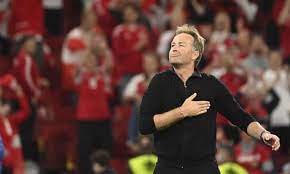By Samindra Kunti in Amsterdam
June 27 – It took Denmark 27 minutes to break Welsh resistance. From the edge of the box, Kasper Dolberg took a couple of touches to engineer space and curl a sumptuous strike in between two defenders and goalkeeper Danny Ward. The Johan Cruyff Arena exploded with raucous joy. The press box was showered with beer and half-naked men ran around in wild celebration.
Dolberg displayed rather more Danish cool, simply lifting his arms to the sky in a statuesque style, repeating the way he celebrated during his time with Ajax.
On the touchline Danish coach Kasper Hjulmand hugged his assistants. This was the textbook example of how he wanted his team to play with wing-back Joakim Maehle linking up with creative outlet Mikkel Damsgaard, who teed up Dolberg.
The momentum was swinging in Denmark’s favour after a robust opening spell from the Welsh, who relied on the pace of both talisman Gareth Bale and Daniel James to attack the wider areas. Denmark shifted shape to play a back four and the Welsh could no longer get a real foothold. On the stroke of half-time, Maehle should have doubled the Danish lead from an acute angle.
The half-time result kept the Arena on tenterhooks. All day there was crackle in the air in the Dutch capital with Danish fans invading the Rembrandtplein. This match signaled Euro 2020’s true beginning. It ignited the knockout stages with an encounter between two of the tournament’s dark horses. They didn’t fall by the way side like Turkey. In fact, both teams have been outperforming greater nations for years. Before the match, Hjulmand said that Wales reminded him of his own team – the Welsh were a band of brothers and owned the small-nation narrative.
But this tournament the unexpected semi-finalist from Euro 2016 no longer enjoyed the neutral support. This time, Denmark’s expansive football, team chemistry and underdog status, has enamoured fans. Above all, the dramatic collapse of talisman Christian Eriksen and a nation enveloped by emotions won hearts and minds.
The Danes were after all in an unprecedented situation. How would Hjulmand’s team react after days of reflection, rumination and finally some guarded rejuvenation? They did in resplendent fashion against Belgium by dominating the world number one for large stretches of the match. With a thumping 4-1 win against Russia, they ensured passage to the round of sixteen.
In many ways, Denmark was the team of the tournament and everyone’s darlings by the end of the group stages, no matter what happened next.
Hjulmand has created an identity for this team, one that the fans, at home and then abroad, have identified with. There is no 1992 vibe yet in Denmark, but the support and national unity has snowballed. That has always been an instrumental part of Hjulmand’s plan to improve this Denmark.
In the end, Hjulmand knew that the ultimate benchmark in a zero-sum game like game would always be the result on the pitch. And that’s why he needed a win against Wales, to prove that Denmark were more than simply a fairytale. He got just that and how.
Dolberg was a bolt of lighting. He illuminated the match with his lethal instincts, destroying those who had still been ignorant of Denmark’s qualities. Right after the restart, he pounced when Neco Williams’ woeful clearance landed at his feet. He jumped for joy, realizing that with his second goal Denmark was on its way to the last eight. The match turned into a victory parade for Dolberg and Hjulmand, with late goals from both Maehle and Martin Braithwaite completing the comfortable win.
At the end, the Danish fans serenaded Hjulmand. He has led the team through the two most difficult weeks of Danish football history, but perhaps the best is yet come.
Contact the writer of this story at moc.l1745564131labto1745564131ofdlr1745564131owedi1745564131sni@i1745564131tnuk.1745564131ardni1745564131mas1745564131

